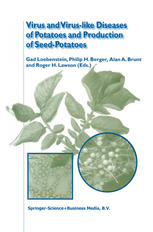

Most ebook files are in PDF format, so you can easily read them using various software such as Foxit Reader or directly on the Google Chrome browser.
Some ebook files are released by publishers in other formats such as .awz, .mobi, .epub, .fb2, etc. You may need to install specific software to read these formats on mobile/PC, such as Calibre.
Please read the tutorial at this link: https://ebookbell.com/faq
We offer FREE conversion to the popular formats you request; however, this may take some time. Therefore, right after payment, please email us, and we will try to provide the service as quickly as possible.
For some exceptional file formats or broken links (if any), please refrain from opening any disputes. Instead, email us first, and we will try to assist within a maximum of 6 hours.
EbookBell Team

4.0
46 reviewsPotatoes, a major vegetatively-propagated crop, has been closely linked with plant virus research during the last 8 decades because, without their effective control potato viruses can cause considerable losses of crop quality and yield. Such research has resulted in marked advances in diagnosis, from relatively simple biological and serological tests to electron microscopy, sophisticated serological procedures and, more recently, the use of polymerase chain reaction (PCR) and nucleic acid hybridization methods. Associated tissue culture research during the past forty years or so has resulted in the successful production of virus-free plants from potato cultivars that were totally infected. Nevertheless, in many countries the high incidence of virus infection still causes considerable yield losses. Because of their importance, potato viruses have also long been important subjects for research; much is thus now known about their intrinsic biological and physico-chemical properties, genomes, gene functions, virus-vector relationships (including specific sites of interaction between viral coat protein and the vector) and their potential as vehicles for transformation.